Nov . 06, 2024 12:51 Back to list
Exploring the World of Gabion Production and Their Applications in Modern Construction
The Gabion Factories A Cornerstone of Modern Civil Engineering
Gabions, which are wire mesh cages filled with rocks or other materials, have become an essential component in various civil engineering and landscaping projects. The term gabion comes from the Italian word gabbione, meaning big cage. As the demand for sustainable and effective construction solutions rises, gabion factories are playing a pivotal role in the production of these versatile structures. This article explores the significance, manufacturing process, applications, and advantages of gabions and their factories.
The Significance of Gabions
Gabions have a long history that dates back to ancient times when they were used for fortifications and flood control. Today, their significance has grown, especially in the face of challenges like soil erosion, flooding, and environmental degradation. Gabion structures are often employed as retaining walls, riverbank protections, and even decorative landscaping elements. Their open design allows for the natural filtration of water, making them an environmentally friendly solution that blends harmoniously with natural landscapes.
Manufacturing Process
The manufacturing process of gabions typically involves several key steps. First, high-quality steel wire is sourced, often treated with galvanization to prevent rust and increase longevity. The wire is then woven into mesh panels, which are typically hexagonal in shape. These panels are either machine-woven or hand-woven, depending on the specific requirements and scale of production.
Once the mesh panels are completed, they are cut and assembled into the desired shapes and sizes, often in bulk to accommodate various projects. After assembly, the gabions are filled with stones or other materials sourced locally, ensuring that they remain cost-effective and environmentally sustainable.
Modern gabion factories incorporate advanced machinery to streamline the production process, allowing them to produce large quantities efficiently. Automation in the manufacturing process not only enhances productivity but also ensures consistent quality in the final products. These factories often adhere to strict industry standards to ensure safety, durability, and functionality in their gabion products.
Applications of Gabions
the gabion factories

The versatility of gabions makes them suitable for a wide range of applications. One of their primary uses is in erosion control. Gabions can be placed along riverbanks and slopes to prevent soil erosion caused by water runoff. This function is particularly crucial in areas prone to heavy rainfall or flooding.
Gabions are also widely employed in road construction and infrastructure projects. They serve as retaining walls, providing stability to sloped areas and preventing landslides. Their natural appearance makes them an attractive alternative to traditional concrete walls, integrating well with the environment.
In landscape design, gabions are used as decorative features, such as seating or planters. Their design can be customized to meet aesthetic preferences while serving functional purposes. Additionally, they are increasingly being utilized in green construction projects as part of sustainable practices.
Advantages of Gabions
There are numerous advantages to using gabions in construction and landscaping. One of the most significant benefits is their environmental sustainability. Because they are often filled with locally sourced materials, gabions reduce transportation costs and carbon footprints. Moreover, the open nature of gabion structures allows for vegetation to grow, promoting biodiversity and improving the ecological balance.
Gabions are also incredibly durable and require minimal maintenance. When constructed correctly, they can withstand harsh weather conditions and recover dynamically after extreme flooding or erosion events. Their flexibility allows them to adapt to changes in the landscape, making them a resilient solution for various environmental challenges.
Additionally, gabions are cost-effective. They often require less labor and material compared to traditional retaining walls and erosion control solutions. With the added benefits of durability and sustainability, gabions present a smart choice for both contractors and environmentally conscious builders.
Conclusion
Gabion factories are at the forefront of producing innovative solutions that cater to the needs of modern civil engineering and landscaping. Their capability to manufacture versatile, durable, and environmentally friendly structures has solidified their importance in constructing resilient landscapes. As we continue to confront environmental challenges, the role of gabions, and the factories that produce them, will undoubtedly grow in significance, representing a harmonious blend of function and nature. Through continued advancements in manufacturing and design, gabion factories are poised to play a critical role in the sustainable development of our built environment.
-
Visualizing Gabion 3D Integration in Urban Landscapes with Rendering
NewsJul.23,2025
-
The Design and Sustainability of Gabion Wire Mesh Panels
NewsJul.23,2025
-
The Acoustic Performance of Gabion Sound Barriers in Urban Environments
NewsJul.23,2025
-
Mastering the Installation of Galvanized Gabion Structures
NewsJul.23,2025
-
Gabion Boxes: Pioneering Sustainable Infrastructure Across the Globe
NewsJul.23,2025
-
Custom PVC Coated Gabion Boxes for Aesthetic Excellence
NewsJul.23,2025
-
Installation Tips for Gabion Wire Baskets in Erosion Control Projects
NewsJul.21,2025






